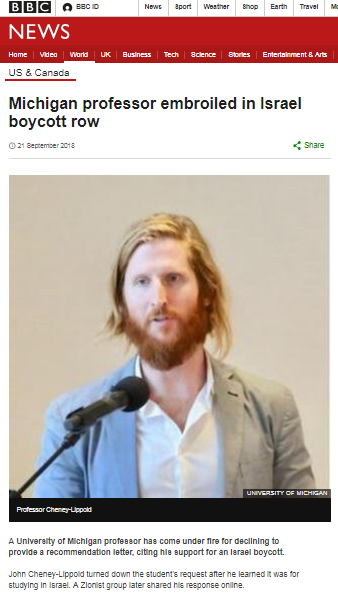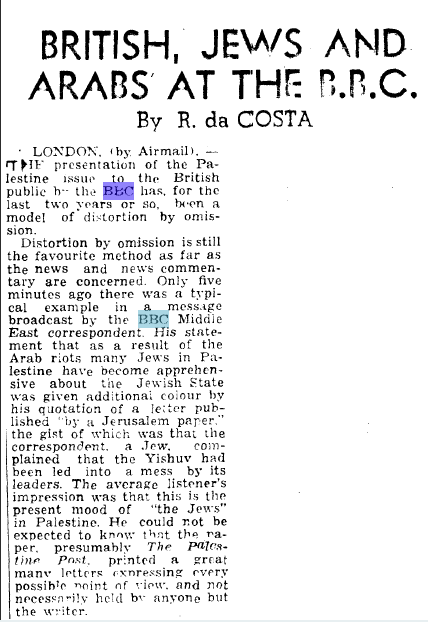A story which had emerged a few days earlier was the topic of an article which appeared on the BBC News website’s ‘US & Canada’ and ‘Middle East’ pages on September 21st under the headline “Michigan professor embroiled in Israel boycott row“.
While presentation of the story itself was little different from that seen at other media outlets, the BBC’s article included the corporation’s usual unsatisfactory portrayal of the anti-Israel political campaign calling for ‘Boycott, Divestment and Sanctions’ (BDS) – including a recycled video – as well as amplification of the ‘apartheid’ smear and some selected links.
Readers were told that:
“The BDS movement accuses Israel of human rights violations and says it opposes “all forms of racism”, including anti-Semitism.”
Critically, BBC audiences were not however informed that one of the BDS campaign’s declared aims is the so-called ‘right of return’ to Israel for millions of Palestinians: a policy intended to eliminate Jewish self-determination. The denial of the right of Jews to self-determination is included in the IHRA definition of antisemitism.
Readers were informed that the Michigan University professor had “told the BBC”:
“I reject any attack of anti-Semitism,” […]
“The boycott of state institutions of Israel has nothing to do with the people – it has everything to do with not normalising a system that is apartheid-like.” [emphasis added]
Apparently not content with that second-hand amplification of the ‘apartheid’ smear, the report went on to tell readers in the BBC’s own words that:
“Israel is accused by some critics of practising a form of apartheid – the state-sanctioned racial discrimination of black people during white-minority rule in South Africa – against Israeli Arabs and Palestinians in the occupied West Bank.
Israel has vehemently rejected this allegation.” [emphasis added]
Readers also found an embedded video captioned “BDS’ Michael Deas explains the thinking behind the boycott” in which they were told that:
“The international community consistently fails to hold Israel to account for its violations of international law. So given this failure, ten years ago – in July 2005 – Palestinian organisations came together to issue an appeal for a campaign of boycotts, divestment and sanctions similar to the boycott campaign that helped end apartheid in South Africa. And the boycott calls for non-violent pressure against Israel until it complies with international law.
The Palestinian call for a boycott of Israel is for a boycott of all Israeli products. Now we know that some people and some organisations are really at the moment only comfortable boycotting products that come from settlements and that’s a position that we understand and can sympathise with. The problem is is [sic] the Israeli export companies that are exporting oranges and avocados, they routinely lie about where their products are coming from so the only safe way for people to avoid buying products from the settlements is not to buy Israeli products altogether.” [emphasis added]
That video was first seen in BBC content in July 2015 and despite the multiple inaccuracies promoted in that unchallenged monologue from professional activist and former LSE student Michael Deas, the corporation has been recycling it ever since.
Readers were also offered a number of links to what the BBC apparently considers related reading both in the body of the report and underneath it:
1) an article mainstreaming BDS by Kevin Connolly from July 2015 – discussed here.
2) a problematic and much amended backgrounder on ‘settlements’ originally produced in December 2016 – discussed here and here.
3) an article about the ‘nation state law’ – discussed here.
4) a report from November 2016 about minorities serving in the IDF – discussed here.
5) a report titled “Why do US evangelicals support Trump’s Jerusalem policy?”.
The BBC’s record of reporting on the anti-Israel BDS campaign is abysmal: for years the corporation has reported related stories without adequately clarifying to its audiences that what that campaign ultimately seeks to achieve is the end of Israel as the Jewish state and while concurrently uncritically amplifying the baseless ‘apartheid’ smear. Moreover, in August 2015, we learned that the BBC considers that provision of such crucial background information is “not our role“.
As this article demonstrates, that editorial policy remains in place and the BBC continues to facilitate the mainstreaming of the politically motivated delegitimisation of the anti-Israel BDS campaign.
Related Articles:
The BBC and the ‘apartheid’ smear
More BBC mainstreaming of the anti-Israel BDS campaign – part one
More BBC mainstreaming of the anti-Israel BDS campaign – part two
More BBC mainstreaming of the anti-Israel BDS campaign – part three
Reviewing BBC reporting on the BDS campaign in 2017




